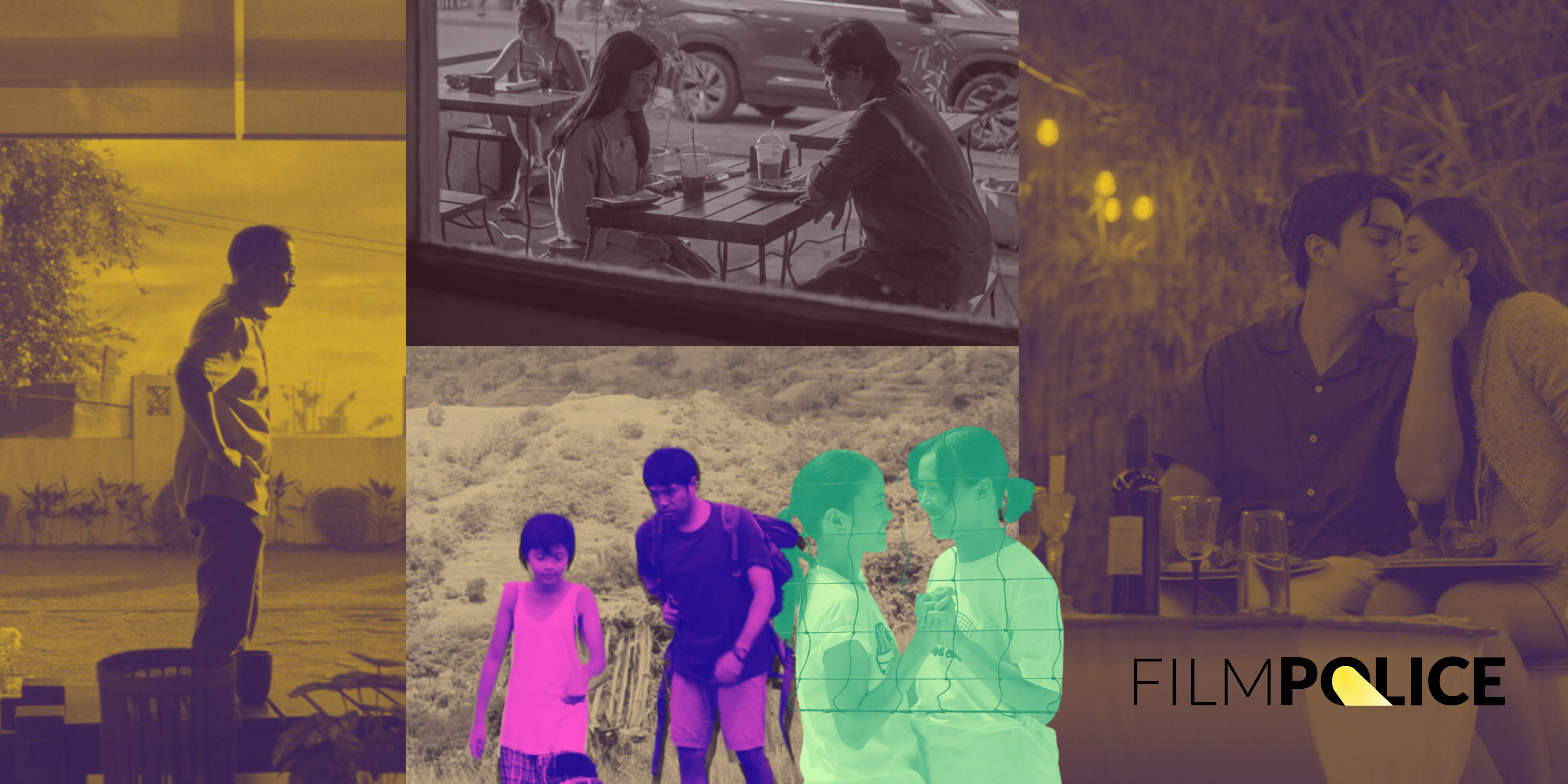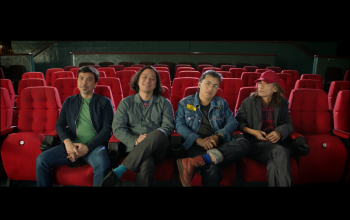Cinemalaya 2023 films are in for special screenings across the country through FDCP’s Cinematheques. Check out the schedule for your local cinematheque here.
As If It’s True
Social media has irrevocably changed the idea of privacy, whether it still exists as we add more and more of ourselves to a curated virtual image, or whether other people are entitled to it or not. For Gemma Stone (Ashley Ortega), that doesn’t even seem like a question: after going viral for a rant in a taxi, she has made herself into an influencer. But a rough breakup has left her career in the doldrums, that is until she meets James (Khalil Ramos), a struggling musician who takes to her immediately. The new relationship sparks a renewed interest in Gemma and her relevance in the internet sphere resurges.
I’ve seen various, often superficial takes on this film as yet another story of social media starring Gen Z millennials, and indeed there is no shortage of such films in the local milieu. I agree to an extent. However, the film is much more complex than it looks, owing to a fantastic usage of form that honestly left me tantalized as the credits rolled.
The fake flower Gemma takes home after her first date with James serves as a visual metaphor for their own relationship – a thing that takes the image of a rose, a symbol of love but one that (in this case) does not possess any of the elements of a real rose – a construct, an artifice representing the real thing. Yet there are hints that James is truly falling in love with his pretend girlfriend, giving her a level of trust that is more intimate than what is implied. But what about Gemma? Is she really only using James as a tool for her own needs?
At first I was sure of the film’s outcome, but near the end this notion was put into serious doubt. If you’ve seen the film, you may have noticed that the soundtrack itself was starting to glitch out. What panache to do this in front of a very attentive Cinemalaya audience, who would question whether it was due to the theater or due to the film itself! Soundtracks are meant to evoke emotion, to guide us towards a certain feeling, as all the formal elements of film are meant to do. But here, it’s like the movie is trying to make us question: what does this music want to make you feel? Why does this music want to make you feel? And is it congruent with what you’re thinking of at this point in the story? Despite a rather conclusive feeling emotional climax, what follows seems to totally deconstruct it!
It’s as if As If It’s True wants to point out the facility of film itself in presenting a virtual image, a constructed reality where you aren’t entirely sure what’s right or not. This is a notion that’s been explored before by the likes of Wells (F For Fake, for example) but a notion that feels very relevant today, when even “truth” feels pliable. It still gives me goosebumps every time I think about it.
This is a film that requires multiple watches, and in a world full of “turn off your brain” entertainment, hot takes and reductive criticism, maybe take a moment to think about what you’ve just seen. I may be in the minority here, but I think this film is a fucking breath of fresh air.
Tether
Relationships entail a level of empathy – of sharing your feelings with another person to the point that sometimes you’re in sync. In Gian Arre’s Tether, that concept is put to its limit.
After a particularly… energetic hookup, Kate (Jorybell Agoto) and Eric (Mikoy Morales) find that they share sensations and feelings between each other – if, say, Kate pinches her leg, Eric will feel his own leg being pinched. If Eric eats something delicious, Kate will feel the sensation of having eaten something delicious. Things take a dark turn when Eric, forever a playboy, makes the boneheaded decision to hookup with someone else, even though he should know that doing the horizontal tango will be felt by Kate as well. Men are stupid.
Tether turns from a fun little premise to a depiction of an extremely toxic relationship: thanks to abandonment issues, Kate becomes extremely possessive and paranoid, while Eric’s promiscuous past and insecurities aren’t exactly helping either. Their connection becomes something that imprisons them rather than something that makes them closer.
The problem lies in the way this premise is executed: the film’s form is, to put it bluntly, bland shot-reverse shot conversations. Most of the (honestly too dragged out for their own good) setpieces are just the characters sitting or standing around somewhere and talking to each other. Had the film’s editing or cinematography matched the two actors’ intensity it would make for a truly chilling experience instead of the slogfest it ended up being. (If Jorybell Agoto is to win an acting award in this Cinemalaya edition, I think it should be for this film.) Technically, the film also suffers from various other problems, from footage that doesn’t look color corrected to sound that can barely be heard (especially during a very crucial scene at the end.)
To be fair to the filmmakers, Tether was a last minute addition to the festival, giving them a very short time to put out a finished film, or at least an approximation of it. A for effort, but Tether ultimately feels unfinished.
Rookie
There’s just something so lovely about the word “comfort”, about something or someone you can trust with all your heart and confide in without judgement, about something or someone that you can seek refuge in, about something or someone that makes you feel seen and heard. For a lot of people, Samantha Lee’s Rookie is a film that embodies that sense of comfort. A sweet, feel-good love story about two people finding that comfort in each other, it’s one of the most romantic local movies of the year.
Ace (Pat Tingjuy) is an awkward teen who loves playing basketball and wonders why the boys in her neighborhood aren’t too keen on letting her play with them. When she transfers to a new school, she learns that there is no basketball varsity team. Instead, she’s recruited by the school’s volleyball coach (Agot Isidro). There, she meets the volleyball team captain Jana (Aya Fernandez) who doesn’t immediately take to the unskilled rookie. But as Ace learns the sport, Ace and Jana begin to find that comfort in each other.
As a sports film, Rookie has its share of flaws. We don’t exactly see why Ace would be a good fit for the volleyball team; the coach seems to only assess Ace’s height though we don’t see her see Ace’s athleticism and she doesn’t teach Ace the ins and outs of a completely different sport from the get go. Though we do see her improve, she becomes a starter very fast (though to be fair, anime does this all the time). There’s a lot to cover here, but the material is perhaps better suited to something longer (and I would not say no to a Rookie series.)
As a youth romance, Rookie is simply exquisite, a natural evolution from Lee’s previous works Baka Bukas and Billie and Emma. Aside from the romance, it also addresses several issues faced by the young women of today, the culture in which they are discriminated against and the difficulties of holding people (especially men) to account for their actions.
I call this one of the most romantic local films of the year because I haven’t rooted for two romantic partners this much for a long time. These are two people, who, in finding comfort in each other, navigate a world that is far from perfect in terms of accepting who they are, and realize their eventual dreams regardless.
Bulawan Nga Usa
Local films often depict the mountain as a place of transformation, healing and self discovery. In Pepe Diokno’s Above the Clouds (2014), it’s a way to grieve; in Ariel Barbarona’s The Highest Peak, the film’s grieving protagonist also considers what his actions as a mining company employee have done to the Lumad population living there and tries to make amends.
Makoy (Ron Matthews Espinosa) has just lost his beloved grandfather. He has lived with him for many years, often traversing the mountain ranges near their home. He is estranged from his mother, who has remarried. In the process of grieving, the spirit of his grandfather calls out to him and Makoy sets out and climbs the mountain to find the mythical golden deer, and more importantly, himself.
Bulawan nga Usa (Golden Deer) is the kind of film you only really see in a film fest like Cinemalaya – with a modest budget, but brimming with imagination. Animated sequences tell the story of the titular golden deer, among other myths and stories Makoy tells the children on the mountain. He finds a kindred spirit in the form of a young boy (John Niel Paguntalan), who has his own form of grieving to work through. The kid’s sister has gone to the city to study, a rare and celebrated occurrence in the mountain community, but it has left the kid feeling as lonely as Makoy.
Bulawan nga Usa is hampered by its own limitations. The most noticeable of the film’s problems is its sound, as most scenes (especially those not taken on the mountain) sound fuzzy and distant. Still, maybe the true golden deer is the golden deer we find along the way, and despite the uncertainty in its conclusion, there is a sense of passing the torch, in that while Makoy’s grandfather was once the source of inspiration for a young boy, Makoy himself is one, too.
Ang Duyan Ng Magiting
I’ve been stuck for a long time making a particular video essay, one that ruminates on the ending of Rae Red’s Babae at Baril (2019), where the titular character, played by Janine Gutierrez, throws away the gun she just gained in the river to try to end the cycle of violence in which she’s been trapped for the past hour and a half or so. In that forever unfinished essay, I explore the two arguments for and against that character’s decision. First, there is the argument of the political philosopher Frantz Fanon, who experienced colonial racism first hand in the Caribbean island of Martinique, who argues that violence, or rather, violent resistance, is a necessity imposed by the colonists upon the colonized – extended to those who oppress, and those who are oppressed, because violence is the only language they speak. Second, there is the reaction or extension (not necessarily a rebuttal, mind) of that concept by the educator Paulo Freire, who argues that education that is free from colonial roots be used to elevate critical consciousness and “fight back,” in that way, enabling those oppressed to regain their humanity.
Dustin Celestino’s Ang Duyan ng Magiting interrogates the necessity of violence in the process of resistance. In more than a dozen chapters, each essentially a one act play on film, Celestino maps out an all too familiar story: two young men (Miggy Jimenez and Dylan Ray Talon) are accused of bombing a church. A social worker (Dolly De Leon) is tasked to help them out, but she meets resistance from the police chief (Paolo O’ Hara) who has his personal reasons for keeping the two where they are. Meanwhile, an activist teacher (Jojit Lorenzo) reels from the fallout of a now-viral rant that has left him facing the true implications of what he has done.
In post screening conversations, an idea came up about how Celestino, an accomplished playwright, has often depicted the (often masculine) nature of violence, and how (often repressed) anger leads to it. A mild spoiler, but this film’s ending is literally two very angry, very indignant men in the midst of committing violence. In Ang Duyan ng Magiting, he crafts a situation where all the parties concerned are driven by their own beliefs, regardless of whether we agree with those beliefs or not, with all those actions mostly spurred on by the instinct to survive, or to ‘other’, or to hate. At the same time, it frames anger and violence in the context of nationalism – how the love for country (either as part of the state or as part of a revolution to transform it) sometimes lets those things in. It lays its thesis bare and I think this is the kind of film that merits serious discussion, definitely not something that can be covered in a short time or in a review like this.
The star studded ensemble is given great material to work with, and pretty much everyone shines in their respective roles. As the film moves from set piece to tense set piece, it doesn’t let up that tension for a minute. As a cinematic experience, the end product is deeply engrossing and definitely worth watching.
These reviews first appeared on John Tawasil’s film blog, Present Confusion. Part 1 of this round-up was written by Roy Narra. Read them all here.




